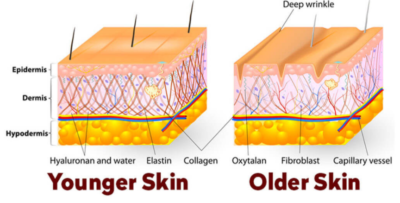 Read on…
Here are our top 6 tips:
Read on…
Here are our top 6 tips:
- Eat foods that contain nutrients that boost production:
- Vitamin C. Large amounts are found in citrus fruits, bell peppers, and strawberries
- Large amounts are found in egg whites, wheat germ, dairy products, cabbage, asparagus, and mushrooms
- Large amounts are found in organ meats, sesame seeds, cocoa powder, cashews, and lentils
- Protein – In addition, your body needs high quality protein that contains the amino acids needed to make new proteins. Meat, poultry, seafood, dairy, legumes, and tofu are all excellent sources of amino acids.
- Ingest collagen in food:
- Certain foods contain high levels of Collagen, bone broth being one of the best sources. Although there isn’t conclusive evidence this boosts collagen in our bodies, anecdotal evidence is good
- Avoid things that damage collagen: smoking, pollution
- Eating too much sugar and refined carbs. Sugar interferes with collagen’s ability to repair itself. Minimize your consumption of added sugar and refined).
- Getting too much sunshine. Ultraviolet radiation can reduce collagen production. Avoid excessive sun exposure
- Smoking reduces collagen production. This can impair wound healing and lead to wrinkles
- Supplements:
- Although there isn’t a wealth of evidence that supplements are effective, the limited studies done do look promising for Collagen supplements
- Stay hydrated!!
- Staying hydrated provides the best environment for encouraging Collagen production, so get drinking that 2 litres a day!
- Face massage:
- Massage can stimulate collagen production and strengthen muscle memory (perfect for facial contours!). Facial muscles are crucial to the way we look and with regular stimulation can lift, tone and tighten the skin, boost blood circulation and collagen production giving a fresh youthful appearance to the skin…








